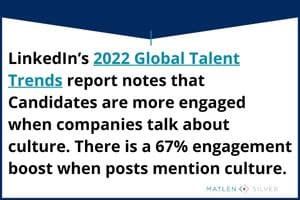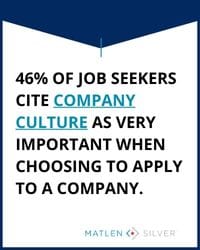by Michele Beilman, Chief Operating Officer
Work culture as a subject has been so heavily covered from various perspectives that often times it’s worrisome that its meaning could become diluted. Thankfully it still remains a critical, if not the most critical, differentiator for top organizations across the globe. Staffing firms, if not more so than other industry organizations, hang their hats on this pillar, because after all, we are the first line in building a company’s work culture with the talented people we deliver.
In the same regard, while culture is the pinnacle of most companies, it’s quickly identifiable when a staffing firm is cultivating a culture viewed as ‘sub-par”. That sounds harsh, but it can be a harsh reality. All too often we hear about unreturned phone calls, resumes falling into the “abyss” and the assembly-line-feeling of a factory agency. The good news is that a less-than-ideal work culture is fixable, and sustaining a positive one is quite doable, with many staffing organizations excelling at it.
There’s no other remedy than being intentional about culture
A great culture starts internally, and it’s driven by leadership – in their words, in their actions, in what they prioritize – and it can either be very intentional, or not. I would encourage all leaders to be very intentional in everything that they do, as you are totally responsible for the organization you lead – on its best day and on its worst day.
“You are totally responsible for the organization
you lead – on its best day and on its worst day.”
At Matlen Silver, we work hard to create an environment for our internal employees built on trust, accountability, and excellence. I want to create an environment where people feel confident to make their own decisions, speak their minds, and walk into any day, any meeting, any event knowing that they have the support of an entire team around them. It’s funny, I was watching a cartoon movie with my daughter a couple of weekends ago and one of the characters said, “If you only do what you can do, you will never be more than you are now.” As much as it was a silly cartoon, it stuck with me. I want my team to feel confident to take risks, step outside their comfort zone and potentially fail – because that’s when we grow the most.
By leading an organization with people at its core, you can create a culture of accountability and development. You create a culture where leadership feels responsible for the success of the team, and the team that knows it’s okay to make a mistake, as long as they own it and learn from it and do better next time. As long as my internal team maintains a culture like that, it will show in the way they interact with our clients and with our consultants.
We are in the people business, and if you treat people simply like you are making a transaction (getting a requirement from a client, scheduling an interview with a consultant, etc.) then it can certainly feel like a factory. Instead, we focus on the fact that our industry is built entirely on relationships. The better, stronger and more genuine your relationships are, the more consultative you can be in your approach because you are working on a foundation of trust. With that, you have to know who you are through and through. There are many firms who claim, “we do it all!” and while there may be some slight truth to that, you are doing your team, your consultants, and your clients a disservice by not owning what you are truly good at and where your strengths lie.
“Being genuine in your interactions, building real relationships, and knowing who you are is
what makes your company stand out
and separate itself from the rest. “
It’s what makes clients trust you with their most important hiring decisions, and is what allows us to have the incredible redeployment and retention numbers we have within our consultant base. And, although it goes without saying, … it’s what makes it fun, and worth doing… because you impacting people’s lives. You are solving a problem, you are finding them their next dream job, you are allowing them to have a judgement-free conversation, you are their brainstorming session.
Making your intentional work culture stand out in the candidate’s market

Companies have to give themselves a long look in the mirror and ask – “Why would someone want to work here and build their career?” And to build on that, ask themselves… “Once we get them here, what’s going to keep them here?”
If there is a long list of answers to that question as to why someone would not want to build their career at that company, then decisions on change must be made. Staying abreast of what your competition is doing is key. If you are the only large corporation in your market requiring vaccinations along with a strict Monday-through-Friday in-the-office schedule, then, yes, you may have trouble attracting talent. If your benefits are more expensive than your competition, and your pay is about 10% lower than what’s being offered in your market, then yes, you may have trouble attracting talent.

We are seeing a lot of our clients start to offer “summer hours” on Fridays, coordinating service days with their teams, or breaking away for some good ‘ol fashion team building. Now, more than ever, leaders must rethink the workplace community and engage their teams with meaningful and genuine connections. Without a strong sense of belonging and community, companies are far more likely to see higher turnover rates, low employee morale and unnecessary workplace drama. By ensuring your company has strong leadership with a strong mission, employees will feel motivated that they are working towards a greater goal with their colleagues.
Transparency is key to a productive company-candidate relationship
The notion of the candidate-market can also leave some organizations reeling. While we have the vision of the “sub-par” agency, we’ve also witnessed candidate ghosting, unrealistic employment demands, and the “chase” after a candidate only to be rejected.
There is a happy medium and that is transparency.
In a hiring negotiation, there sometimes comes a point where you have to assess what the candidate wants and what you are offering as an employer and determine what’s a non-negotiable. Again, knowing who you are as a leader, who you are as a company, and ensuring you are treating all your employees as equals is key. Laying that all on the table at the front end of the recruiting and interview process, on both the candidate and employer’s side, will save a lot of heartache on the back end.
Both parties must have open communication about what they want and what is being offered, and know when it’s not going to work, so that both can move on and find the best fit for them. That’s what hiring is all about, after all, finding that best fit. If either party feels like they are conceding on anything, in the long run, it’s not going to be the best match and there will be a cultural breakdown.
We avoid these breakdowns by fostering an intentional work culture and allowing it to permeate through every experience – with internal team members, clients, stakeholders, supplier partners and of course, consultants. This is precisely Matlen Silver’s calling card – Experience Matters – and it is a principle on which we stand that drives all our relationships and shapes our culture for today and tomorrow.
A note about the writer:
Michele Beilman joined Matlen Silver in 2013 as a recruiter, quickly rising through the ranks to her current role as SVP of sales and operations. We are proud of Michele and her recent recognition as a top industry influencer in Staffing Industry Analyst’s 40-Under-40 List. She lives by the words she shared and is a staunch advocate for building company cultures that embrace everyone tied to an organization. Below is an excerpt from this recent recognition that embodies the spirit of the culture that Michele is integral in cultivating here at Matlen Silver.
Amid the rapid growth, Beilman has improved processes, empowered her internal team and removed obstacles to build a world-class organization. “I want to create an environment where people feel confident to make their own decisions and speak their minds and walk into any day, any meeting, any event knowing that they have the support of an entire team around them,” she says. “I’m really leading through mentorship and making sure that in my role I’m driving the pieces along, ensuring that we’re all focused on a common goal and staying on track to get the outcome that we’re looking for.”
Read the full SIA profile on Michele Beilman here.


